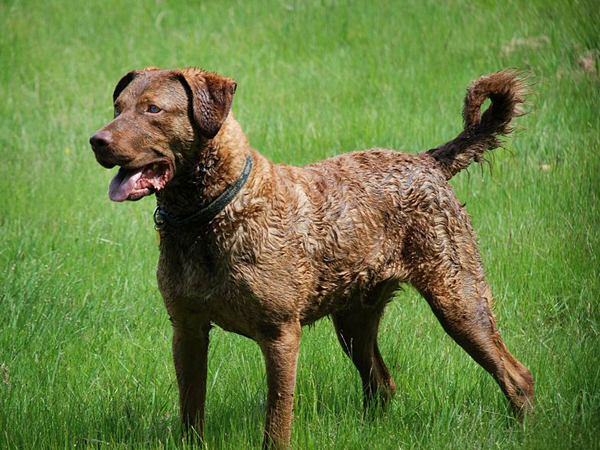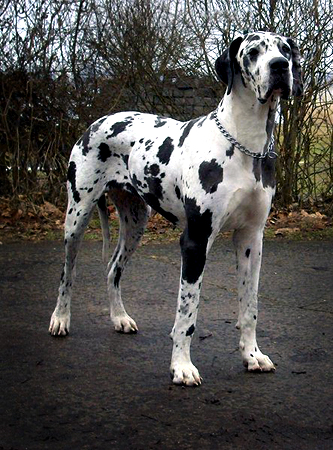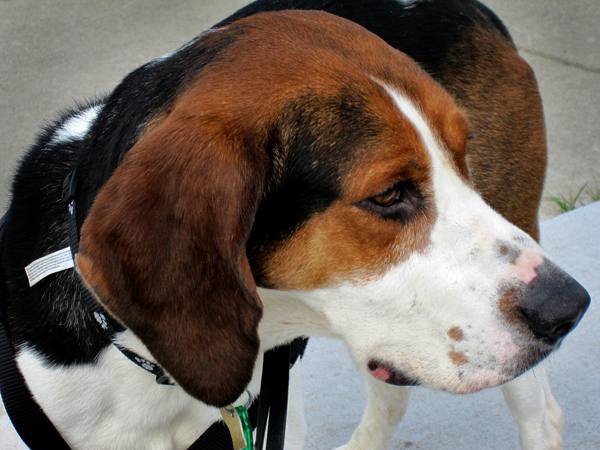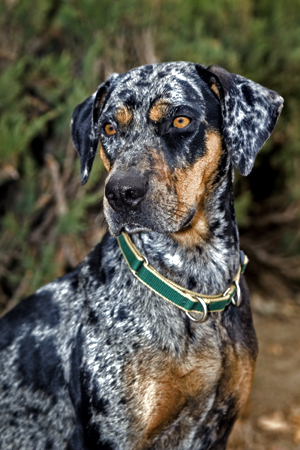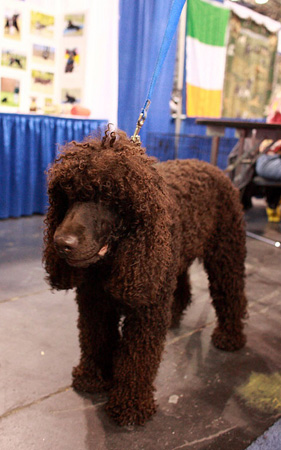“The Great Dane's Head Resembles the Outline of the Commonwealth's Boundaries"
A short history of legislation honoring official state dogs.

Photograph by Ronald Müller-Hagen.
It is impossible to have a rational, let alone civil, discussion in American politics today. Forget the debt ceiling debate and the furor over Obamacare. Consider Kansas House Bill 2513, Rep. Ed Trimmer’s proposal to make the Cairn terrier—that being the wiry tan breed that played Toto in The Wizard of Oz—the Sunflower State’s official dog. This seemingly uncontroversial measure was vigorously derided on the Internet and drew the ire of People for the Ethical Treatment of Animals, which pretty much doomed the bill before it had a chance to build momentum. “If passed, HB 2513 would worsen one of Kansas’ serious problems: its reputation as a hotbed for cruel, filthy puppy mills,” wrote Martin Mersereau, director of PETA’s cruelty investigations department.
This is a dissent based on what I call the 101 Dalmatians Principle, and it’s a fairly common position taken by both PETA and its apparent enemies—the official clubs that lord over specific breeds, promoting healthy and responsible reproduction. It comes up every time a new breed wins at Westminster, the president of the United States picks a pooch, or a hit film or TV show makes a breed famous. (I have little doubt that the Jack Russell people are wary of The Artist.)
But Trimmer did not abandon the bill in fear of his reputation. “We had great responses from kids,” the state representative told the Wichita Eagle, and he vowed to raise the matter again after rallying his youngest constituents. “This will give me a chance to go into the classrooms and visit with them,” he told the paper. “To let them know [that] sometimes when you ask the first time, and the answer is no, you have to learn how to ask again.”
The representative is on to something there. The pleas of children, both answered and unanswered, provide the through line in America’s long, surprisingly tortuous history of canine-honoring legislation. Two years ago, for example, Alaska Gov. Sean Parnell signed a bill declaring the Alaskan malamute the official state dog in front of more than 400 grade-school students and their parents. The malamute’s exalted status came after three years of lobbying on behalf of Polaris Elementary student Paige Hill, who first mentioned the idea to her kindergarten teacher in 2007. The school rallied behind the concept, bringing the matter to the attention of state reps.
“It wasn't easy, but it was fun,” Hill, a third-grader by the time the bill was approved, told the Anchorage Daily News. “I am glad the Malamute is the state dog and my grandma Shirley is very proud of me."
A few years earlier, it was a group of Bedford, N.H., seventh-graders who brought a prick-eared, frizzy-coated breed known as the Chinook to the attention of that state’s legislature. The kids, who helped their cause by hauling a winsome Chinook named Abby to the state Senate hearing, won passage of a bill venerating that “sled and work dog, the only breed to have originated in New Hampshire and one of the few created in America.”
Small children aren’t always needed to get a state legislature to honor man’s best friend. Pennsylvania, one of the first to consider the matter of an official state dog, took up the cause of the Great Dane—selected because several of the behemoth dogs appear in a famous painting alongside Ben Franklin—with admirable verve. “When the Speaker of the House called for a voice vote … yips, growls, and barks assaulted his ears from every part of the chamber!” Rep. Sam Rohrer supposedly noted. “With a rap of his gavel, the Speaker confirmed that the ‘arfs have it.’ ”
The Pennsylvania bill, a classic example of midcentury dog-honoring, reads in part:
Whereas, the Great Dane represents both the great hunting and industrial parts of Pennsylvania, having begun as a hunting breed just as Pennsylvania began as a hunting Commonwealth, later also becoming a leading working breed, just as Pennsylvania became a leading working Commonwealth; and
Whereas, the outline of the Great Dane's head resembles the outline of the Commonwealth's boundaries; and
Whereas, the Great Dane is known as the King of his species, just as Pennsylvania's State Bird is known as the King of its species; and
Whereas, the physical and other attributes of the Great Dane, to wit: size, strength, beauty, intelligence, tolerance, courage, faithfulness, trustworthiness and stability exemplify those of Pennsylvania; and
Whereas, naming an official dog of the Commonwealth would recognize the steadfast service and loyal devotion of all dogs in Pennsylvania and provide a symbol of the great Home side of Pennsylvania
Maryland and Virginia, which chose the Chesapeake Bay retriever and the American foxhound in 1964 and 1966 respectively, also seem to have picked their official dogs with little controversy. So did North Carolina and Texas, whose dog bills gained passage thanks to the usual political recipe: weird amendments and favors to rich people. North Carolina’s 1989 law making the Plott hound the state pooch included a passage that made dog theft a felony offense. (It also stated that the “taking of a dog for temporary purposes is a misdemeanor,” making North Carolina the only state to criminalize unauthorized dog borrowing.) And in 2005, Texas’ influential and wealthy Lacy family—which provided much of the granite for the state Capitol—lobbied on behalf of the blue Lacy hunting dog, a breed they themselves had developed for hunting. “Whereas, the Blue Lacy is a Texas native, a working dog bred to play an essential role in ranch operations, at a time when ranches themselves became one of the iconic Texas symbols, and a dog that has more than pulled its weight on many a Texas spread,” the bill read, and Gov. Rick Perry signed it into law.
But in the history of American canine lawmaking, those states have been the easygoing, kidless exceptions. Consider Massachusetts, where the eventual selection of the Boston terrier, nicknamed “the American gentleman,” hardly seems controversial. (Or at least seems less controversial than the state’s official muffin. Yes, Massachusetts has a state muffin, and it is corn.) Consider that the Boston terrier was developed in the city for which it is named, and it never lacked influential fans—Gov. Michael Dukakis proclaimed a “Boston Terrier Week” in 1975, and Tip O’Neill managed to get the U.S. Congress to name it the official dog of the Bicentennial. And yet, when a group of fifth-graders from Marlborough first attempted to get the dog’s status made official in 1978, they were shot down by the state Senate. The Boston terrier was granted official status only when, a year later, a woman named Irene Ryan took it upon herself to write state pols hundreds of letters on the terrier’s behalf.
This wasn’t the only time the kid lobby was quashed. In 1985, the same year South Carolina honored the Boykin spaniel—a compact, curly-eared water dog bred to work on boats in the state’s riverine swaps—the dog politicking got ugly in Wisconsin. It all started when Lyle Brumm decided to teach his eighth-graders about how state government works. According to a story in AKC Family Dog magazine, Brumm’s students lobbied the Legislature to select the American water spaniel, making 11 separate trips to the capitol until a bill was drafted and passed by the state Assembly in 1983.
That was just phase one. A year later, the bill was put before the Senate Committee on Urban Affairs and Government Operations, where senators didn’t just oppose the measure—they trashed it. According to a New York Times report, one lawmaker “interrupted the children's testimony with howling and barking.” Sen. Mordecai Lee declared that sending the bill to the Senate floor would be “opening a can of worms on such measures. In fact, I believe the worm will be the next state symbol.” He concluded by going full Scrooge: “We shouldn’t pass bills because a high-school class wants it.” Even worse was the reaction of Sen. Dan Theno, who called the American water spaniel—a dog bred in Wisconsin—a "flea-bitten mangy mutt that has the propensity to be ornery," adding that it had a tail "like a rat.”
As you might expect, the politicians’ mockery of a motivated bunch of kids didn’t go over well. Gov. Anthony Earl vowed to rectify the situation, and made good; after escorting a second bill through the Senate, he signed it into law in front of 1,000 students and Lyle Brumm. "I can't resist a few puns,” Earl told the assembled. “I've only been able to come here today because of the dogged determination you've shown.”
If the dogged Rep. Ed Trimmer has his way, Kansas will not follow the lead of Georgia, which tried and failed to honor the golden retriever in 1991, then gave up the matter entirely. Instead, Trimmer hopes Kansas will join Wisconsin et al. as the 12th U.S. state to select and honor an official dog. If that happens, the Cairn terrier will join the barred tiger salamander (amphibian), the ornate box turtle (reptile), and the little bluestem (grass) as state symbols. “You just never know about a bill like this,” Trimmer told the Wichita Eagle, capturing the essence of canine legislation. “Sometimes they take a while and sometimes they fly right through.”
